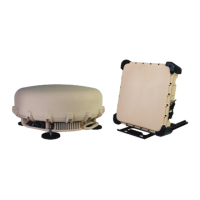5-8
RF-7800B
SCHEDULED MAINTENANCE
well-ventilated area. If a battery leak is detected, follow
appropriate Hazardous Materials (HAZMAT) procedures to
reduce risk of personal injury.
Dispose of partially and fully discharged batteries in accordance with your local directives. Improper disposal of
hazardous waste is prohibited by law.
When using BA-5590/U Lithium batteries, it is recommended that the user consult MIL-B-49430 (ER), MIL-SPEC,
batteries, non-rechargeable, Lithium Sulfur Dioxide, and MIL-B-49430/3D (ER), MIL-SPEC, batteries,
nonrechargeable, Lithium Sulfur Dioxide BA-5590/U.
5.3.3 Rechargeable Battery Packs
Do not overcharge, short circuit, incinerate, or mutilate
rechargeable batteries. Charge batteries per manufacturer’s
instructions. Failure to comply could cause personal injury or
death.
Optional battery chargers are available to provide fully automatic battery charging and fault detection. Models are
available for single or multiple battery charging, and display the status of each connected battery during operation.
Contact Harris for particular applications.
5.3.4 Disposing of Lithium Batteries
Do not dispose of batteries in uncontrolled trash, as batteries
may contain hazardous materials. Check with local directives
for proper disposal. Failure to comply could cause injury or
death to personnel.
Store multicell lithium sulfur dioxide batteries in a well
ventilated area away from personnel. Do not activate the CDD
of a damaged battery. Damaged multicell lithium sulfur
dioxide batteries must be processed as hazardous waste and
should not be thrown into a local dumpster. Otherwise,
personal injury or death may result.
Lithium batteries, whether discharged or partially discharged, should only be disposed of per local directives. Refer
to local directives for additional information on lithium batteries. Do not place lithium batteries in trash compactors.
Refer to local directives for more information on lithium batteries.

